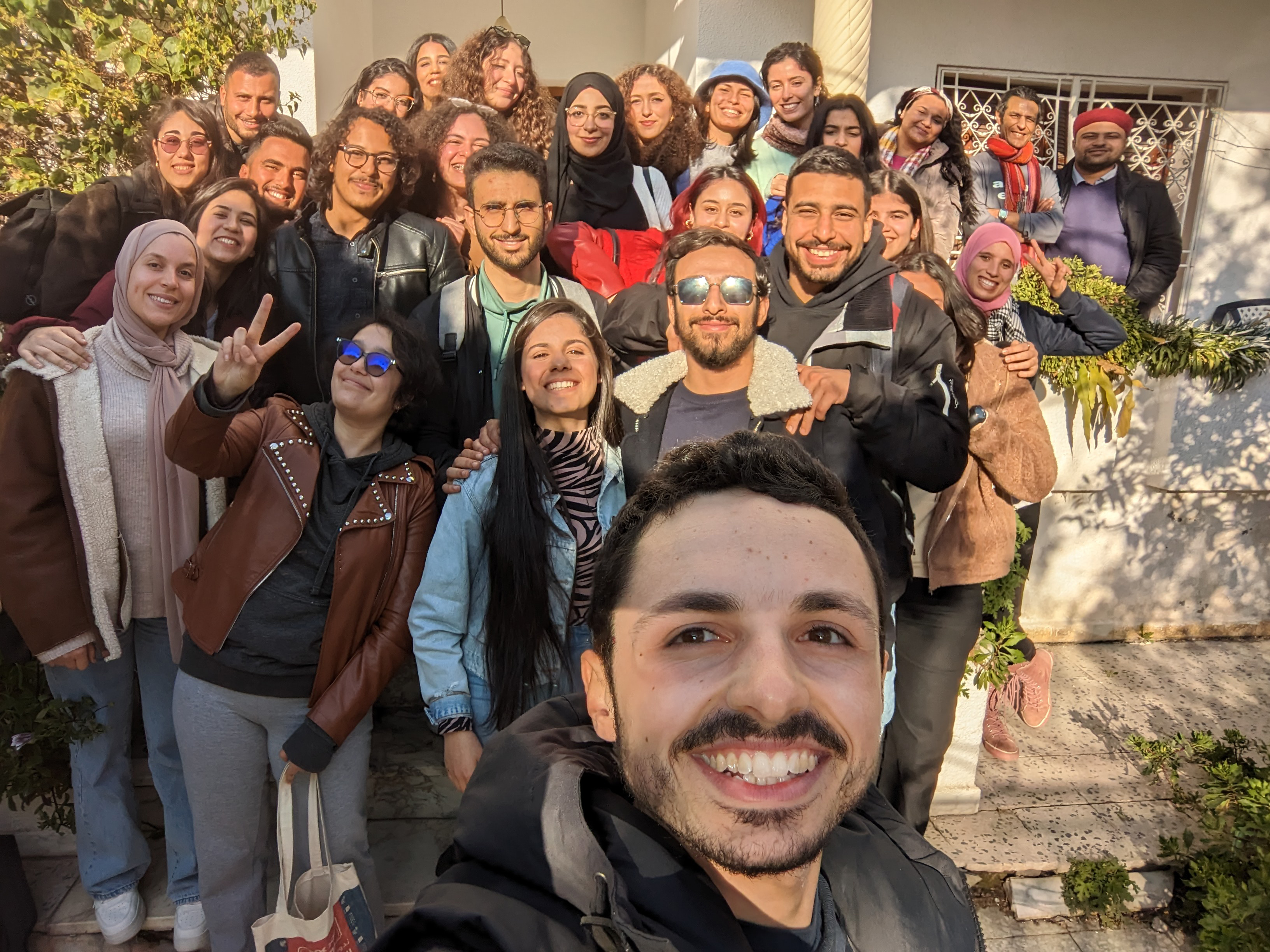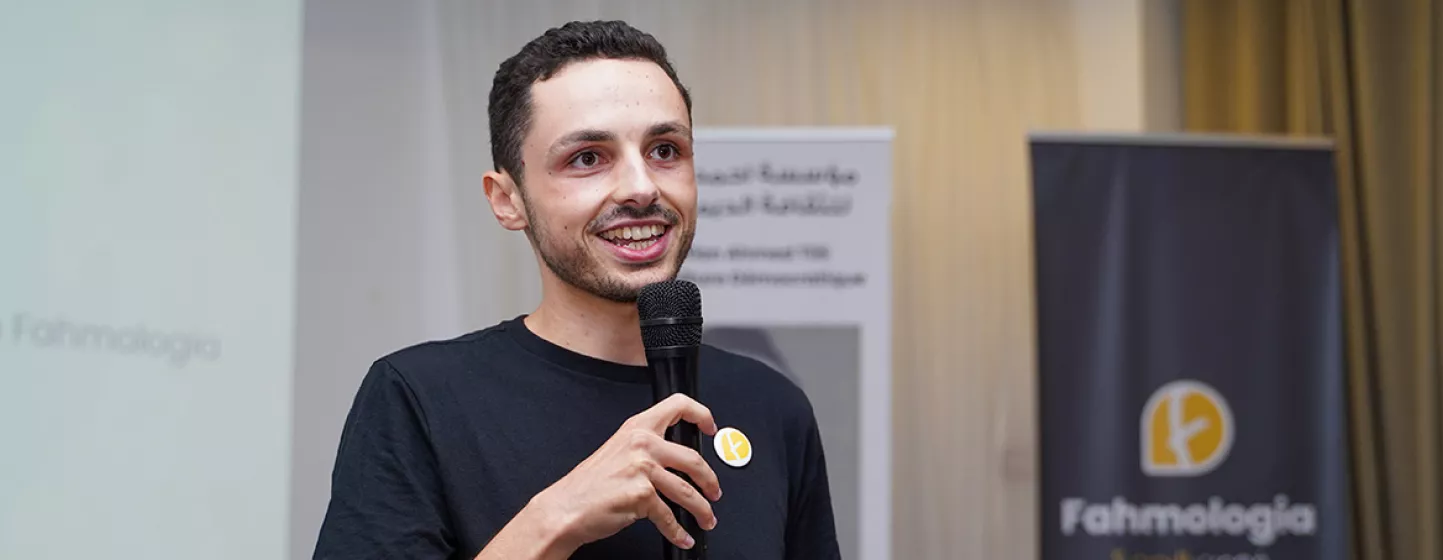Mehdi Cherif: science without conscience...
A brilliant student, Mehdi Cherif, 25, has chosen to share his knowledge and bring science to the masses. His project, Fahmologia ("the science of understanding"), has led to the creation of six clubs at six different academic institutions in Tunis, as well as the production of around 30 videos.
Profile by Emmanuel de Solère Stintzy.
"Science without conscience is the soul's perdition". This quote from the French author François Rabelais seems to strike a chord with Mehdi Cherif, co-founder and Tunisian coordinator of the Fahmologia ("science of understanding") project, which is supported by the Safir programme.
"Our initial aim was to create a media outlet specialising in scientific communications, but it wasn't feasible without money... As I had previously worked with civil society networks, I thought why not create a network of clubs? We now have six clubs in six different academic institutions in Tunis with a total of around 100 members. We have trained 24 students, acting as club leaders, in project management and content production across all of the branches of science (natural, human and social etc.) that they are studying," explains Mehdi methodically, his chin resting on one hand in a pose akin to that of Rodin's "The Thinker".
But how did this project come about? It's a question that risks sending our intellectual back into a reverie, but let's ask him anyway... "When I was falling behind at law school in France, I would walk around with headphones listening to France Culture podcasts. I would think to myself that it would be great if Tunisians also understood science," replies Mehdi Cherif. But make no mistake, our podcast lover is anything but a slacker...
"Our national treasure, he will help Tunisia!"
Amel Bouaziz Cherif, his grandmother, has a lot to say about her grandson, who has been living with her for eight years: "He always came top of his class! He loved being left alone to read a book and being in his own little world. Having passed his scientific baccalaureate with distinction, he would have been accepted into any foreign university, but he is currently studying in Tunisia (Editor's note: having completed a bachelor's degree in sociology, he is studying for a research master's in sociology at the Faculty of Humanities and Social Sciences of Tunis). Mehdi is our national treasure, he will help Tunisia!"
Despite boasting a CV that indicates his valedictorian status at every stage and that he also earned a degree in social psychology via an online course (The Open University, Milton Keynes, United Kingdom), Mehdi Cherif keeps his feet on the ground, stepping into his future role as a sociologist: "My father was a diplomat and my mother had a management degree, so they were both aware of the importance of education. I was lucky that I could understand things easily, that I was healthy and that I was being raised in a relaxed environment. My great-grandfather, grandfather and father were all civil servants, so I am trying to follow in their footsteps by also working for my country".
By the age of just twenty, Mehdi had already written two essays (Réflexions d'un élève insoumis [Musings of a disruptive student] and Ils sont parmi nous: GERM et éducation en Tunisie [They walk among us: GERM and education in Tunisia], on the subject of educational reform in Tunisia). Nour Maaoui, Fahmologia Coordinator at the Faculty of Humanities and Social Sciences of Tunis, explains: "When I met Mehdi five years ago, he already had an ambitious vision to improve the Tunisian education system. So I joined his team and learned how to produce media content. We are trying to raise awareness of our project among media outlets and on social media in order to bring it to a wider audience".
Fahmologia's Facebook page has more than 6000 followers who have access to the thirty or so videos produced by students on a range of topics (climate change, global water distribution, international finance etc.).
Elsewhere in Africa?
While receiving support from Safir, Mehdi Cherif appreciated the various contributions made by CFI: "Its media expertise and support in the areas of administrative and financial management. The international meetings were also an enormous help to us, as we aim to extend our student club model to other African countries". This was always an obvious next step for Youssef Tlili, co-founder of Fahmologia and Chair of the Ahmed Tlili Foundation for Democratic Culture, which is sponsoring the project: "Fahmologia makes knowledge more accessible to the general public. In the future, trained students will be called upon to offer support to the youngest. The clubs have developed a culture of sharing and solidarity: they all learn from one another and share a desire to be useful to their society".
In the near future, Mehdi Cherif hopes to make the production studio used to create scientific content profitable and to establish "democratic governance". The objective is to cement Fahmologia's long-term future. He will then pass the baton to younger members and return to his beloved studies so that he can finish writing his dissertation.
In ten years
What will Fahmologia have developed into in ten years? With his passion for scientific communication, Mehdi Cherif hopes that science will be better represented in the media and on social networks in Tunisia. One of his dreams is to "stumble upon content produced by Fahmologia students!"
And what about Mehdi himself, what will he be doing in a few years' time? Fahmologia co-founder, Youssef Tlili, predicts: "Mehdi may still be a valuable contact for Fahmologia, but he could also be a university lecturer or an active and useful public figure in society". Amel Bouaziz Cherif, his grandmother, seems to agree: "It seems that Mehdi has set himself a mission! He will, without a doubt, work towards a doctorate and will continue with community work. He might even go into politics: I know how he feels about the inequality and corruption that is blighting our country..."
The man of the hour responds wisely: "First of all I am going to finish my dissertation and then I will write my thesis. I want to write about meritocracy. Politics? That will depend on the circumstances, on a lot of things, but why not?" He almost sounds like a politician already!


